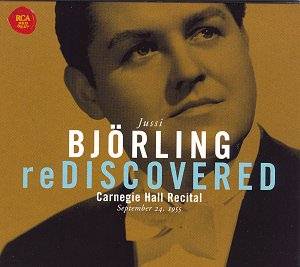As the record companies re-cycle their back catalogues,
at ever lower prices, and hence reduced profit, several have hit
on the idea of issuing live performances of favourite or contracted
artists. DG was early in the opera field with performances conducted
by Karajan, and EMI likewise with Callas in public performances,
some hitherto only available in poorly recorded versions from
less than fully legitimate sources. RCA hit a winner with the
widely acclaimed ‘Leontyne Price Rediscovered’ and now follow
with this Björling issue.
Whilst claiming that this is the first time the
complete concert has been available, the admirably informative
accompanying booklet information, in English, German and French,
and all words with English translation, is fully open about the
fact that all but 9 tracks have been available previously on LP
or CD. It is also true to say that all the items here can be found
elsewhere in studio recordings by the singer. One of the most
comprehensive issues is the recent EMI ‘The Very Best of Jussi
Björling’, reviewed by me elsewhere
on this site. That issue, like much of the singer’s discography,
is with orchestral accompaniment, whilst this concert is with
piano. Not having to ‘ride’ an orchestra does make a significant
difference to the singer’s approach, particularly evident in the
operatic pieces where his use of pianissimo and mezza voce, with
concluding diminuendo, is sheer delight. The same can be said
of his so soft conclusion to Puccini’s ‘Che gelida manina’ (tr.
26) which brings enthusiastic applause. The downside of live performance
is the intrusion of applause, less so in a recital than a performance
of an opera, and it is carefully abbreviated here. Recording characteristic
can also be a problem. Here it is clear but recessed albeit with
a slight boxiness to the sound.
As to the performance, the tenor is certainly
in fine voice, his excellent diction, with control of legato and
graceful phrasing, contributing to an outstanding all round performance
to which the audience responds with ever increasing warmth. Particularly
noteworthy in the first part of the concert is the fine characterization
in the Schubert songs (trs. 3-6) sung with ease and a wide range
of modulation and tone. These virtues are repeated in the Grieg
and Sibelius (trs. 14-18). In the opera arias Björling’s
singing is full of expression and passion particularly in ‘E lucevan
le stelle’ (tr. 22). I personally found the piano inadequate to
colour the textures in ‘Addio alla madre’ (tr. 20), but the accompaniment
does allow Björling to finish Tosti’s ‘Ideale’ (tr. 23) with
a soft falling diminuendo, if that is not a tautology, to die
for. The only piece where I found the singer uncomfortable was
in Mozart’s ‘Il mio tesoro’ (tr. 10) where his voice sounds too
heavy and the lift into the head voice laboured. The singer introducing
each piece himself is an added pleasure to the whole.
A very worthy issue that will give pleasure to
those of the singers admirers who prefer the frisson of a live
performance, applause and all, to studio versions. With the singer
in such good voice, and generous with encores, all included, the
recital must have been quite an occasion for those privileged
to be present.
Robert J Farr

